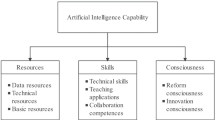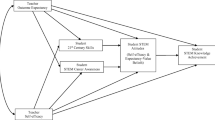ABSTRACT
The purposes of this study were to explore the effects of thinking styles on science achievement and attitudes toward science class among Taiwanese elementary school students and to explore the differences between male and female students in their modes of thinking. Participants included 756 sixth-grade students from 28 classes in four elementary schools in Taiwan. Data were collected from three data sources: (a) Style of Learning and Thinking to identify students’ thinking style, (b) Science Achievement Test to assess students’ science achievement, and (c) Asian Student Attitudes Toward Science Class Survey to measure students’ attitudes toward science class. Findings revealed that across both boys and girls, there were significant differences between the three modes of thinking with regard to attitudes toward science class but no significant difference between the three modes of thinking with regard to science achievement. Even though students of both genders tended to be more holistic in their thinking, students with an analytic thinking style and an integrative thinking style showed more positive attitudes toward science class than students with a holistic thinking style. Taiwanese male students tended to be more holistic thinking than their female counterparts, whereas Taiwanese female students tended to be more analytic thinking in contrast to male students.
Similar content being viewed by others
References
Ali Bawaneh, K. A., Abdullah, A. G. K., Saleh, S. & Yin, K. Y. (2011). Jordanian students’ thinking styles based on Herrmann whole brain model. International Journal of Humanities and Social Science, 1(9), 89–97.
Bernardo, A. B., Zhang, L. F. & Callueng, C. M. (2002). Thinking styles and academic achievement among Filipino students. The Journal of Genetic Psychology, 163(2), 149–163.
Bernardo, A. B., et al (2009). Intellectual styles and academic achievement: A developmental perspective. Psicothema, 21(4), 555–561.
Cano-García, F. & Hughes, E. H. (2000). Learning and thinking styles: An analysis of their interrelationship and influence on academic achievement. Educational Psychology, 20(4), 413–430.
Cheng, H., Andrade, H. L. & Yan, Z. (2011). A cross-cultural study of learning behaviours in the classroom: From a thinking style perspective. Educational Psychology, 31(7), 825–841.
Dong, Y. & Lee, K. P. (2008). A cross-cultural comparative study of users’ perceptions of a webpage: With a focus on the cognitive styles of Chinese, Koreans and Americans. International Journal of Design, 2(2), 19–30.
Fer, S. (2012). Demographic characteristics and intellectual styles. In L. F. Zhang, R. J. Sternberg & S. Rayner (Eds.), Handbook of intellectual styles: Preferences in cognition, learning, and thinking (pp. 109–130). New York: Springer.
Ford, N. (1995). Levels and types of mediation in instructional systems: An individual differences approach. International Journal of Human-Computer Studies, 43(2), 241–259.
Ford, N. & Chen, S. Y. (2001). Matching/mismatching revisited: An empirical study of learning and teaching styles. British Journal of Educational Technology, 32(1), 5–22.
Gafoor, K. (2007). Does present education favour executive and external styles of thinking at the expense of achievement in science? (ERIC Document Reproduction Service No. ED504150)
Grigorenko, E. L. & Sternberg, R. J. (1997). Styles of thinking, abilities, and academic performance. Exceptional Children, 63(3), 295–312.
Knight, N. & Nisbett, R. E. (2007). Culture, class and cognition: Evidence from Italy. Journal of Cognition and Culture, 7, 283–291.
Kyriakides, L. (2005). Extending the comprehensive model of educational effectiveness by an empirical investigation. School Effectiveness and School Improvement, 16(2), 103–152.
Lenola, A. S. (1996). Capitalizing on diversity: Strategies for customizing your curriculum to meet the needs of all students. Science Teacher, 63(2), 20–23.
Madrazo, G. M. & Motz, L. L. (2005). Brain research: Implications to diverse learners. Science Educator, 14(1), 56–60.
Masuda, T. & Nisbett, R. E. (2006). Culture and change blindness. Cognitive Science, 30(2), 381–399.
Messervey, D., Ji, L. J. & Uchida, Y. (2004). Culture and cognition. In C. Spielberger (Ed.), Encyclopedia of applied psychology (pp. 357–364). San Diego: Elsevier.
Messick, S. (1984). The nature of cognitive styles: Problems and promise in educational practice. Educational Psychologist, 19(1), 59–74.
Monga, A. B. & John, D. R. (2007). Cultural differences in brand extension evaluation: The influence of analytic versus holistic thinking. Journal of Consumer Research, 33(4), 529–536.
Na, J., Grossmann, I., Varnum, M. E. W., Kitayama, S., Gonzalez, R. & Nisbett, R. E. (2010). Cultural differences are not always reducible to individual differences. Proceedings of the National Academy of Sciences, 107(14), 6192–6197.
Nachmias, R. & Shany, N. (2002). Learning in virtual courses and its relationship to thinking styles. Journal of Educational Computing Research, 27(3), 315–329.
Nisbett, R. E. (2003). The geography of thought: How Asians and Westerners think differently…and why. New York: The Free Press.
Nisbett, R. E., Peng, K., Choi, I. & Norenzayan, A. (2001). Culture and systems of thought: Holistic versus analytic cognition. Psychological Review, 108(2), 291–310.
Norenzayan, A. & Nisbett, R. E. (2000). Culture and causal cognition. Current Directions in Psychological Science, 9(4), 132–135.
Peterson, E. R., Rayner, S. G. & Armstrong, S. J. (2009). Researching the psychology of cognitive style and learning style: Is there really a future? Learning and Individual Differences, 19(4), 518–523.
Riding, R. J. & Agrell, T. (1997). The effect of cognitive style and cognitive skills on school subject performance. Educational Studies, 23(2), 311–323.
Sternberg, R. J. (1997). Thinking styles. New York: Cambridge University Press.
Sternberg, R. J. & Grigorenko, E. L. (1997). Are cognitive styles still in style? American Psychologist, 52(7), 700–712.
Sternberg, R. J. & Zhang, L. F. (2005). Styles of thinking as a basis of differentiated instruction. Theory into Practice, 44(3), 245–253.
Sternberg, R. J., Grigorenko, E. L. & Zhang, L. F. (2008). Styles of learning and thinking matter in instruction and assessment. Perspectives on Psychological Science, 3(6), 486–506.
Torrance, E. P. (1988). Style of learning and thinking: Administrator’s manual. Bensenville: Scholastic Testing Service.
Vengopal, K. & Mridula, K. (2007). Styles of learning and thinking. Journal of the Indian Academy of Applied Psychology, 33(1), 111–118.
Wang, T. L. (2008). Brain hemispheric preferences of fourth- and fifth-grade science teachers and students in Taiwan: An investigation of the relationships to student spatial and verbal ability, student achievement, teacher and student attitudes, and teaching practice. Dissertation Abstracts International, 69(08). (UMI No.3325580)
Wang, T. L. & Berlin, D. F. (2010). Construction and validation of an instrument to measure Taiwanese elementary students’ attitudes toward their science class. International Journal of Science Education, 32(18), 2413–2428.
Zhang, L. F. (2001a). Do styles of thinking matter among Hong Kong secondary school students? Personality and Individual Differences, 31(3), 289–301.
Zhang, L. F. (2001b). Do thinking styles contribute to academic achievement beyond self-rated abilities? The Journal of Psychology, 135(6), 621–637.
Zhang, L. F. (2002). Thinking styles: Their relationships with modes of thinking and academic performance. Educational Psychology, 22(3), 331–348.
Zhang, L. F. (2004). Revisiting the predictive power of thinking styles for academic performance. Journal of Psychology, 138(4), 351–370.
Zhang, L. F. (2005). Does teaching for a balanced use of thinking styles enhance students’ achievement? Personality and Individual Differences, 38(5), 1135–1147.
Zhang, L. F. (2007a). Intellectual styles and academic achievement among senior secondary school students in rural China. Educational Psychology, 27(5), 675–692.
Zhang, L. F. (2007b). Revisiting thinking styles’ contributions to the knowledge and use of and attitudes towards computing and information technology. Learning and Individual Differences, 17(1), 17–24.
Zhang, L. F. (2011). The developing field of intellectual styles: Four recent endeavours. Learning and Individual Differences, 21(3), 311–318.
Zhang, L. F. (2012). Thinking styles in student learning and development. In P. Jarvis & M. Watts (Eds.), The Routledge international handbook of learning (pp. 84–93). New York: Routledge.
Zhang, L. F. & He, Y. F. (2003). Do thinking styles matter in the use of and attitudes toward computing and information technology among Hong Kong university students? Journal of Educational Computing Research, 29(4), 471–493.
Zhang, L. F. & Sternberg, R. J. (1998). Thinking styles, abilities, and academic achievement among Hong Kong university students. Educational Research Journal, 13(1), 41–62.
Zhang, L. F. & Sternberg, R. J. (2001). Thinking styles across cultures: Their relationship with student learning. In R. J. Sternberg & L. F. Zhang (Eds.), Perspectives on thinking, learning and cognitive styles (pp. 197–226). Mahwah: Erlbaum.
Zhang, L. F. & Sternberg, R. J. (2005). A threefold model of intellectual styles. Educational Psychology Review, 17(1), 1–53.
Zhang, L. F. & Sternberg, R. J. (2006). The nature of intellectual styles. Mahwah: Erlbaum.
Author information
Authors and Affiliations
Corresponding author
Rights and permissions
About this article
Cite this article
Wang, TL., Tseng, YK. DO THINKING STYLES MATTER FOR SCIENCE ACHIEVEMENT AND ATTITUDES TOWARD SCIENCE CLASS IN MALE AND FEMALE ELEMENTARY SCHOOL STUDENTS IN TAIWAN?. Int J of Sci and Math Educ 13, 515–533 (2015). https://doi.org/10.1007/s10763-013-9503-z
Received:
Accepted:
Published:
Issue Date:
DOI: https://doi.org/10.1007/s10763-013-9503-z




